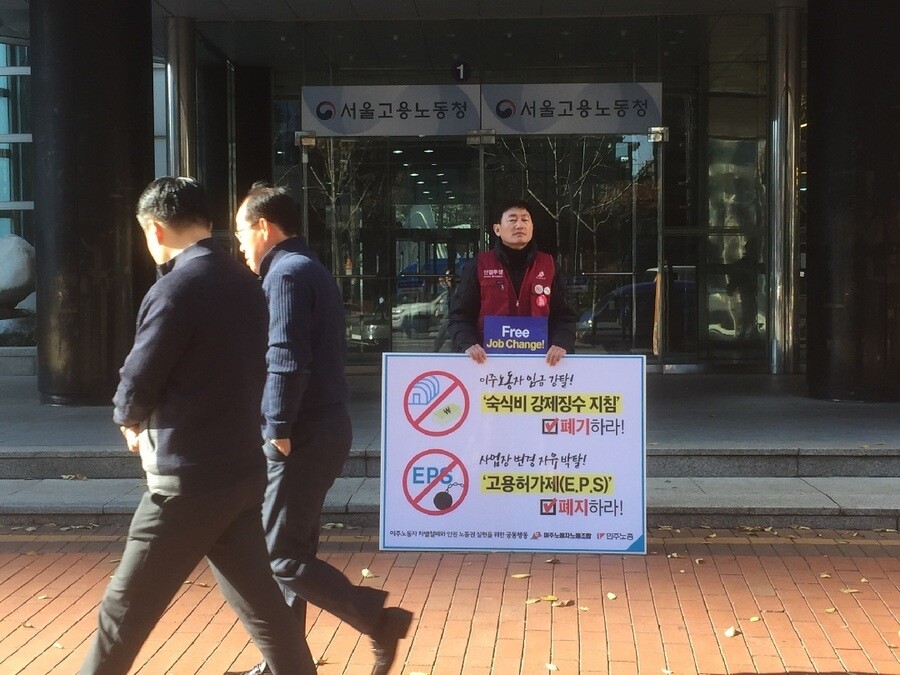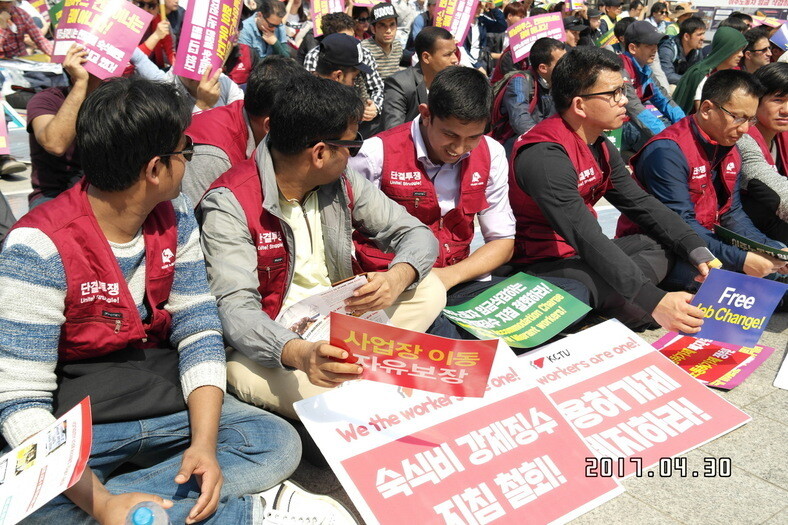hankyoreh
Links to other country sites 다른 나라 사이트 링크
One-person demonstrations begin in support of migrant workers’ rights

It was around noon on Dec. 4, with midday temperatures of zero degrees Celsius – five below with the wind-chill factor. In front of the Seoul Labor and Employment office in Myeongdong, Migrant Trade Union (MTU) President Udaya Rai was braving the icy winds to carry out a one-man demonstration. The day marked the beginning of two weeks of one-person demonstrations all around South Korea through Dec. 15, with participants in Seoul, Gyeonggi Province, North Chungcheong Province, Daegu, Busan, and elsewhere calling for an end to the migrant workers’ board and lodging deduction guidelines. Members of the Korean Confederation of Trade Unions (KCTU) and various local migrant worker groups are taking part.
The word “poor” does not do justice to the living environment for migrant workers in South Korea. The nature of livestock and farming workplaces in the provinces, isolated as they are from the outside world, is such that much of the housing is positively grim: container boxes and vinyl greenhouses that lack heating or air conditioning and leak when it rains. Bathrooms are often slapped-together temporary units just outside the dormitory. Most of the housing does not have locks, leaving female workers in particular defenseless against predatory behavior by employers and others. In exchange for this housing, migrant workers have up to 20% deducted from their already minimum wage-level pay.
Accompanying Rai at his one-person demonstration was Kishor Lama, a 34-year-old from Nepali who works with two other migrant workers at a business in Gimpo, Gyeonggi Province, collecting and selling materials for metal recycling. Lama lives in a container box that has been repurposed as a temporary building. His employment contract has him earning regular wages of 1.26 million won (US$1,160) for 20 eight-hour days of work a month, not including holidays. It comes out to just minimum wage. Free lunches were provided, along with “other temporary residential facilities” at the worker’s expense.
Yet the amount Lama took home last month was only 900,000 won (US$830) – his employer having arbitrarily deducted 360,000 won (US$330). It seemed like a huge amount to have taken out, yet Lama has no way of knowing the specifics of the deduction. He receives no pay slip, and his employment contract does not indicate housing or food costs. Sometimes he is told there is no work to do, and the day is subtracted from his pay; other times, he is made to work on days off without any extra pay. It’s a violation of his employment contract – and thus the law.
In Nepal, Lama is a member of the elite, a graduate of Tribhuvan University of Nepal who worked as a reported for a local weekly before arriving in South Korea through the employment permit system in spring 2015. Yet even he is helpless in the face of the injustices suffered by migrant workers here.
In Feb. 2017, the Ministry of Employment and Labor created guidelines for providing food and lodging information for foreign workers and deducting related expenses, a system that went into effect in March. They state that up to 20% of regular wages can be deducted from migrant workers’ wages in advance for food and lodging with their written consent. When both food and lodging are provided, the deduction is 20% for an apartment, detached home, or row/multiplex housing and 31% for other temporary residences. When only lodging is provided, the respective deductions are 15% and 8%. Almost without exception, employers take the maximum.
In the case of 1.26 million won in monthly pay and a container box for accommodations, the deduction comes out to just 100,000 won (US$92). In Lama’s case, however, three to four times that has been deducted for various incomprehensible reasons.
Some question the very legality of the prior deduction system. Article 43-1 of the Labor Standards Act states that “payment of wages shall be directly made in full to workers in currency.” But the Ministry of Employment and Labor recognizes prior deductions with written consent, citing an Oct. 2011 Supreme Court decision finding it not in violation of the “payment in full“ principle provided the worker consents “of his or her own free will.”

It is questionable, however, how realistic it is for migrant workers to sign food and lodging contracts “of their own free will” from their position of vulnerability, provided with poor food and housing and restricted in their freedom to choose where to work.
The ministry’s current guidelines also include only a standard for calculating migrant workers’ food and lodging costs, without any review or oversight for conditions, let alone legal standards. For this reason, the MTU and human rights groups have criticized the guidelines as effectively a forced food and housing deduction system – granting approval for another form of wage exploitation.
In September, Lee Yong-deuk and 13 other Democratic Party lawmakers proposed amendments to the Labor Standards Act and Act on Foreign Workers’ Employment, etc., that would require a presidential decree establishing standards for the structure, facilities, location, and environment of foreign worker dormitories in lines with International Labour Organization (ILO) standards. Currently pending in the National Assembly, the bills would assign the employer responsibility for establishing and providing prior notification on housing facilities that meet certain standards, offer partial state and local government support for costs, and increase the Ministry of Employment and Labor’s management and oversight responsibility.
By Cho Il-jun, staff reporter
Please direct questions or comments to [english@hani.co.kr]

Editorial・opinion
![[Column] Park Geun-hye déjà vu in Yoon Suk-yeol [Column] Park Geun-hye déjà vu in Yoon Suk-yeol](https://flexible.img.hani.co.kr/flexible/normal/500/300/imgdb/original/2024/0424/651713945113788.jpg) [Column] Park Geun-hye déjà vu in Yoon Suk-yeol
[Column] Park Geun-hye déjà vu in Yoon Suk-yeol![[Editorial] New weight of N. Korea’s nuclear threats makes dialogue all the more urgent [Editorial] New weight of N. Korea’s nuclear threats makes dialogue all the more urgent](https://flexible.img.hani.co.kr/flexible/normal/500/300/imgdb/original/2024/0424/7317139454662664.jpg) [Editorial] New weight of N. Korea’s nuclear threats makes dialogue all the more urgent
[Editorial] New weight of N. Korea’s nuclear threats makes dialogue all the more urgent- [Guest essay] The real reason Korea’s new right wants to dub Rhee a founding father
- [Column] ‘Choson’: Is it time we start referring to N. Korea in its own terms?
- [Editorial] Japan’s rewriting of history with Korea has gone too far
- [Column] The president’s questionable capacity for dialogue
- [Column] Are chaebol firms just pizza pies for families to divvy up as they please?
- [Column] Has Korea, too, crossed the Rubicon on China?
- [Correspondent’s column] In Japan’s alliance with US, echoes of its past alliances with UK
- [Editorial] Does Yoon think the Korean public is wrong?
Most viewed articles
- 1‘We must say no’: Seoul defense chief on Korean, USFK involvement in hypothetical Taiwan crisis
- 2N. Korean delegation’s trip to Iran shows how Pyongyang is leveraging ties with Moscow
- 346% of cases of violence against women in Korea perpetrated by intimate partner, study finds
- 4[Column] Park Geun-hye déjà vu in Yoon Suk-yeol
- 5‘Weddingflation’ breaks the bank for Korean couples-to-be
- 6Will NewJeans end up collateral damage in internal feud at K-pop juggernaut Hybe?
- 7Amnesty notes ‘erosion’ of freedom of expression in Korea in annual human rights report
- 8[Interview] Dear Korean men, It’s OK to admit you’re not always strong
- 9Korean government’s compromise plan for medical reform swiftly rejected by doctors
- 10[Editorial] Japan’s rewriting of history with Korea has gone too far